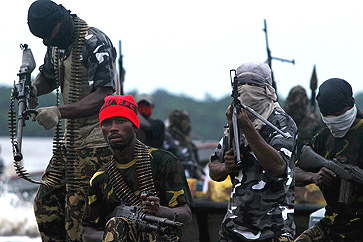
 The huge decline in crude oil production largely occasioned by militant attacks in the Niger Delta has caused the country to lose at least N100.4bn in earnings in 13 days.
The huge decline in crude oil production largely occasioned by militant attacks in the Niger Delta has caused the country to lose at least N100.4bn in earnings in 13 days.
Official reports indicate that the nation’s oil output has dropped by 800,000 barrels per day to 1.4 million bpd since May 16.
The Minister of State for Petroleum Resources, Dr. Ibe Kachikwu, confirmed this. Since the figure was released, attacks on oil infrastructure in the Niger Delta have continued, pushing output down further. The supply disruptions have significantly affected oil exports as four of the nation’s five largest export streams have been totally suspended. Currently, Forcados, Qua Iboe, Bonny Light and Brass River are under force majeure. All but Qua Iboe is as a result of militant attacks.
At $49 per barrel and N197 per dollar for the crude oil price and official exchange rate, respectively, the 800,000 barrels amount to N100.39bn in the 13 days to May 28.
In a report, the US Energy Information Administration stated that pipeline sabotage and oil supply disruptions in Nigeria had increased in 2016, putting direct pressure on the country’s finances.
“Because Nigeria heavily depends on oil revenue, its economy is noticeably affected by changes to its oil production and/or to global crude oil prices,” the report said.
An energy expert and Technical Director, Drilling Services, Template Design Limited, Mr. Bala Zakka, described the recent attacks as a huge sabotage of the nation’s economy and reputation in the international community.
Last month, the International Energy Agency estimated that Nigeria could lose an estimated $1bn (N197bn) in revenue by May, when it expects repairs on Shell’s Forcados to be completed. The terminal may not restart until June, Kachikwu had said on April 20.
The IEA said, “The Forcados terminal in Delta State, one of Nigeria’ biggest terminals, was scheduled to load 250,000 barrels of crude per day. At $40 per barrel, Nigeria could stand to lose an estimated $1bn between February, when force majeure was declared, and May, when repairs are expected to be completed.”
It was gathered that increased violence over the past few weeks had made international buyers more reluctant to buy Nigerian crude due to fears of loading delays and cancellations.
Globally, Brent crude, against which Nigeria’s oil is priced, has been trading around $48 and $50 in recent days.
The country’s 2016 budget, which was signed into law recently, assumes 2.2 million bpd of oil production at $38 per barrel.
The oil-rich Niger Delta has been rocked by attacks since February that have cut Nigeria’s output to the lowest in almost three decades, threatening the projected N820bn oil revenue for this year.
A group, known as Niger Delta Avengers, has claimed responsibility for most of the attacks, the latest being the damage to Chevron’s main electricity feed pipeline at the Escravos terminal late on Wednesday.
In February, Shell declared force majeure — a legal clause that allows it to stop shipments without breaching contracts — after militants blew up a pipeline feeding the Forcados export terminal, knocking out at least 250,000bpd.
Early this month, the oil major also declared force majeure on exports of Bonny Light crude after a leak on one of its trunk lines in the Niger Delta, days after an attack on Chevron’s Okan platform, a collection facility for offshore oil and gas that feeds the Escravos terminal.
Chevron said the damage to the Okan platform had affected about 35,000 bpd of its net crude production, or about 15 per cent of its output in the country.
ExxonMobil had to declare force majeure on shipments of Qua Iboe after a drilling platform ran aground and damaged the pipeline it jointly owns with the Nigerian National Petroleum Corporation.
Qua Iboe is Nigeria’s largest crude oil stream and exports usually amount to more than 300,000 bpd. Its terminal handled 342,000 bpd last year.
In April, Italian oil major, Eni, had to declare force majeure on exports of its Brass River grade after a pipeline fire. The suspension was lifted days after.
Just last week, the oil major again declared force majeure, following an attack on a key pipeline at the Brass Rivers terminal.
The Head of Energy Research, Ecobank Capital, Mr. Dolapo Oni, in a telephone interview with our correspondent, said, “The 2016 budget estimated that the government would make N820bn this year from the oil sector that will come from an estimated 2.2 million bpd at $38 per barrel.
“Now, for the first five months of the year, Nigeria’s production has averaged about 1.4 million bpd. It was 1.7 million bpd for the first quarter; April and May, it has been 1.4 million. That tells us that we have lost a huge amount, at least a quarter of that N820bn.”
